A Quote by Zoe Buckman
When I became older and started to become more in tune with my political leanings, there was a disconnect between the feminist in me and the hip hop side of me, and I don't know if, in some way, those influences are also present in Tupac's work.
Related Quotes
I wouldn't compare my sound on the mixtape to anything, but my influences are like - the minimal amount of hip-hop that I actually do know - because I didn't grow up listening to hip-hop like that. No one really put me on to hip-hop like that... My dad's from Jamaica and my mom is from Barbados, so that's really the stuff I grew up listening to.
Socially, hip-hop has done more for racial camaraderie in this country than any one thing. 'Cause guys like me, my kids - everyone under 45 either grew up loving hip-hop or hating hip-hop, but everyone under 45 grew up very aware of hip-hop. So when you're a white kid and you're listening to this music and you're being exposed to it every day on MTV, black people become less frightening. This is just a reality. What hip-hop has done bringing people together is enormous.
I listen to all those kinds of music, from classic soul to hip-hop to Brazilian music to, you know, jazz to indie to alternative... And for me, when I'm making music, it's all in my head, and all those influences in my head. So if something comes to me that's a reference from a different genre then people are used to hearing from me, I'm not afraid to go there with it.
Some artists are definitely trying to do different styles. Some, not a lot. But even from what you've seen [of] Outkast, Kanye West, and Lil' Wayne, and different people expressing their way of evolving in hip-hop. In the evolution of hip-hop, they're doing different things. And you've seen hip-hop have more of a global presence and impact on the world.
Even though hip-hop started as a battle format, different artists appeared on each other's records or hung out in the same clubs, supporting each other. That was a profound influence. Also, hip-hop, to me, represents limitless possibility. Hip-hop is always evolving. People say, "Oh, it's a very commercial thing, it's too R&B." But in six months, a record is gonna come out that will completely change that.
I would like to encourage hip hop artists to invite those of us who are in the queer spaces in, so we can have those conversations. I love hip hop. If you bring me in the studio, I know how to act. And we can talk about what's not cool because, clearly, there's still homophobia that penetrates in all these areas.






































